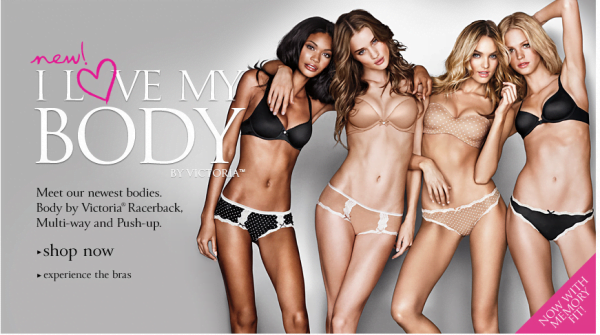Over the past decade, India has seen a massive increase in the number of industries that feed off the insecurities of women. Almost as a reaction, we saw a parallel and simultaneous rise in the number of body acceptance campaigns.
“Body acceptance means approving of and loving your body despite its real or perceived imperfections. When you see your body with love and approval, you are living your life from a place of body acceptance and respect.”
There is no dearth of body acceptance campaigns all around the world constantly telling us that ‘size doesn’t matter.’ Quite ironically, even Victoria’s Secret models took the initiative to come up with an ‘I Love My Body’ campaign. We saw initiatives like the Dark is Beautiful campaign gain mass traction.

The National Organisation for Women Foundation went ahead to mark October 18, 2017, as the Love Your Body Day, as a part of its campaign.
Why We Need Body Acceptance Campaigns
Fat shaming and skinny shaming incidents force millennials to achieve unreasonable levels of perfectionism, which cause them to experience levels of anxiety, depression, and thoughts of suicide, higher than any generations past. Body acceptance campaigns work towards improving the lives of such people.
These campaigns also slam beauty brands, fairness creams, fitness brands, plastic surgeons and ‘fat-go’ oil companies that tell us that only fair skins and slim waists are worthy of being admired.
The importance and relevance of the concept of body acceptance is insurmountable today and probably will be for a long time to come. But all is not hunky-dory when it comes to our approach to body acceptance campaigns.
Where We Went Wrong
Due to the campaigns, there is increased sensitization around the harms and consequences of body shaming. Discussing someone’s body image is a sensitive topic that millennials nowadays don’t like to engage with. ‘Fat’ and ‘obese’ have become taboo words.
Any advice given to someone that could be potentially perceived as an attempt to body shame is avoided. We go out of our ways to tell people that ‘size doesn’t matter’ and that there is no perfect body size or shape.
We tell them that their ability or willingness to maintain a so-called perfect body has nothing to do with their personality or attractiveness.
Related: In Pics: Resistance Training Helps You Even As You Are Ageing
Today, this approach has given birth to a generation of millennials that have become complacent about their bodies, because body acceptance told them that all bodies are perfect. This complacency can be seen in our lazy daily routines and food habits.
We link our body acceptance campaigns to our lifestyles. Body acceptance gives us the privilege to be respected equally in society no matter what our body type or size may be, but that is not a ticket or privilege to be as unhealthy as we can be.

Doctors have begun to express their concern about the low levels of stamina, high levels of cholesterol, depression tendencies and diabetes that are troubling this generation, more than any generation in the past.
According to the Indian Medical Association, ‘residents in the capital of New Delhi today are eating about 20% more fat and 40% more sugar than they did six decades ago.’
Millennials are doing the same while burning fewer calories, taking public transportation or driving private cars instead of walking or bicycling.
Nearly 30% of India’s teenagers are obese, which is almost twice the number in 2010, according to health ministry statistics.
With 50.8 million Indians suffering from diabetes, India still remains the ‘diabetes capital’. And as per a study of the International Diabetes Federation, it is estimated that by 2030, about 9% of India’s population could likely be affected by diabetes.
Body acceptance is not a wrong concept; indeed, it has helped millions get over their body image issues. But we wrong ourselves when we allow body acceptance ideas to brainwash us until we can not distinguish between health and body anymore.
Health and Body Are Different
Rather than concentrating on the concept of health, these campaigns usually obsess over bodies. Health is a broad kind of lifestyle that tells to remain as fit and active as we can, while the concept of the body is narrow and talks about our physical dimensions, something that is many a time, uncontrollable.
The concept of health is something very personal and subjective. For a 50-year-old arthritis patient, 2 rounds of a park may be adequate exercise to stay fit and healthy, but for a 22-year-old college student, it may be 10 rounds.
In short, our healthy lifestyles are more important than our body dimensions. And even though the two are very closely related, it is important to concentrate on the health aspect more than the body aspect.
We adore people who follow appalling health habits and still manage to have healthy bodies, and we judge people who have healthy lifestyles, but not so perfect bodies. As a smart society, we need to appreciate the latter.
Our campaigns need to talk about our healthy lifestyles and their acceptance rather than concentrating on our bodies and their dimensions. As a society, we need to transition from a body-based approach to a health and lifestyle-based approach.
Image Credits: Google Images
Sources: Livemint, NDTV, NOW Foundation + more
You’d Also Like To Read:
The Science Behind Piercings: Why Indians Pierce These Specific Body Parts And Its Benefits

































